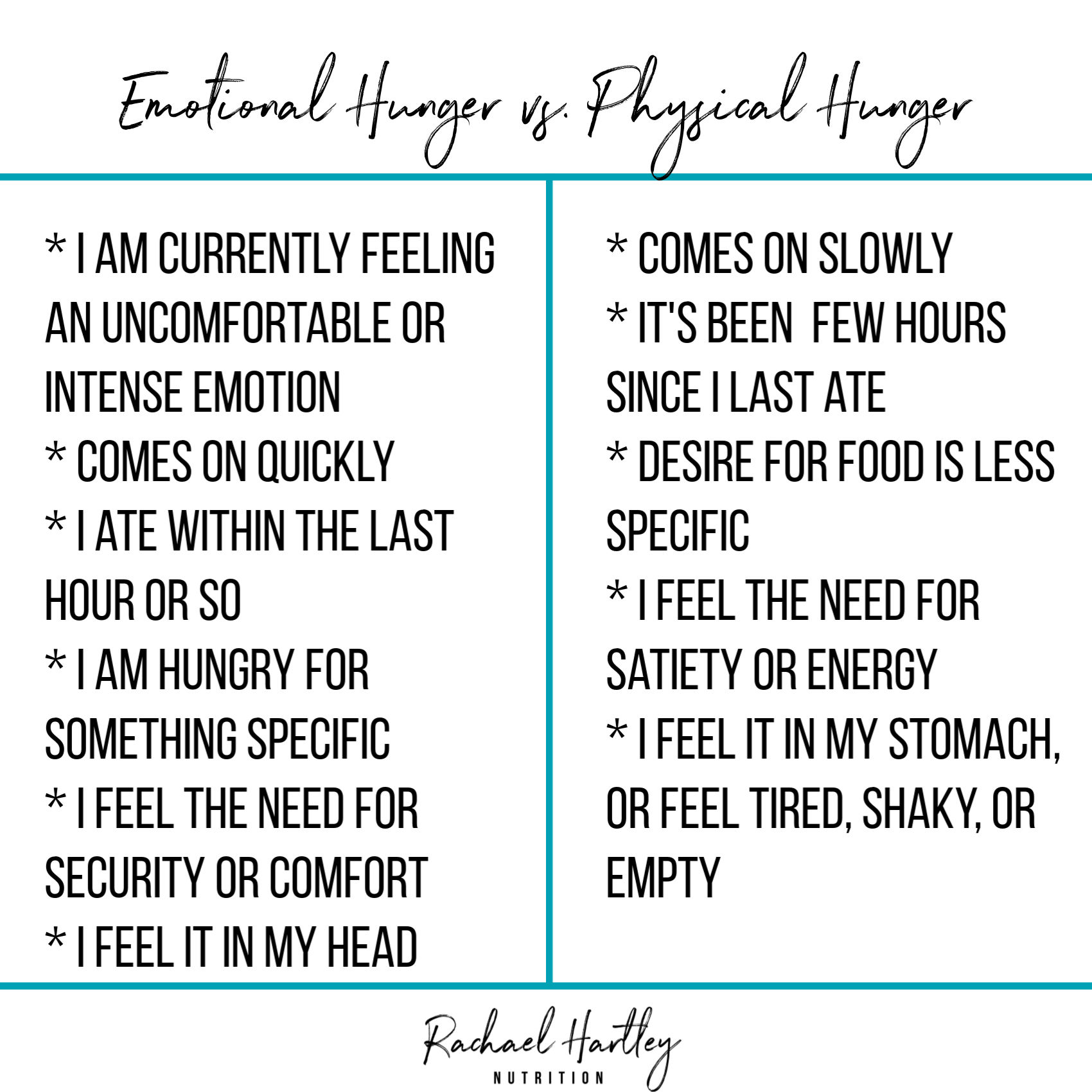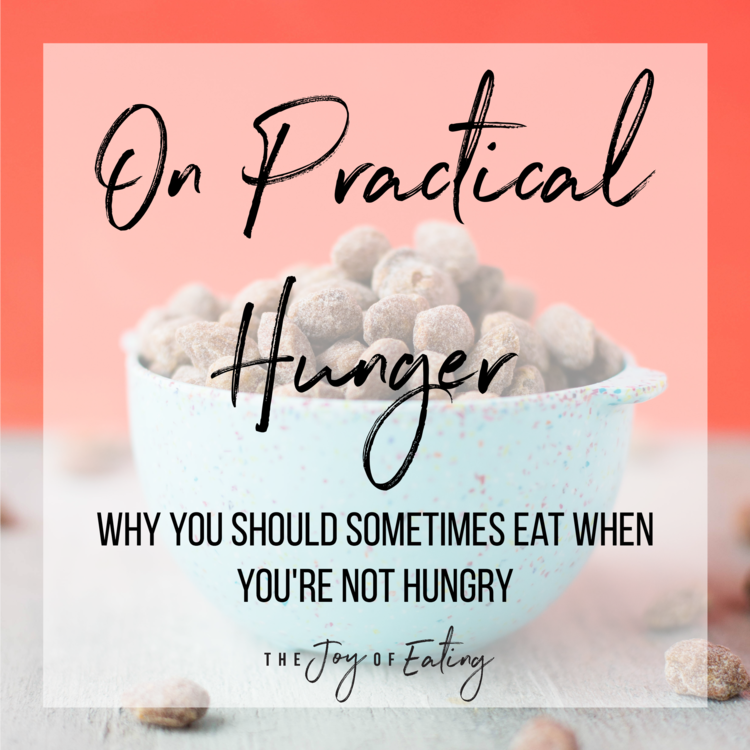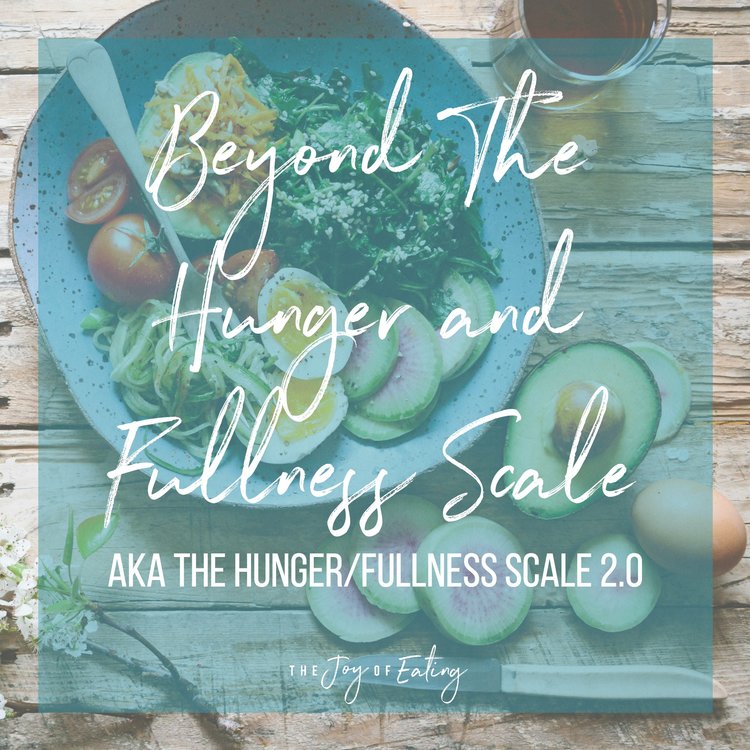Why Am I Hungry All The Time?
Honor your hunger is the second principle of intuitive eating, so as you can imagine, it’s a pretty important one. Without feeding your body adequately and consistently throughout the day, it’s incredible challenging, and perhaps impossible, to make peace with food, respect fullness…or really to engage with most of the other principles of intuitive eating.
Wonky hunger cues are a common side effect of dieting. By constantly suppressing hunger, it’s not uncommon for chronic dieters to not feel hunger until it’s all of a sudden at a ravenous, primal level. When you start feeding your body throughout the day, and tuning to to those subtle signs of hunger, you might notice yourself feeling hungry more frequently. That can be really disconcerting for someone who is in the process of building back trust with their body. Clients sometimes wonder “why am I hungry all the time?”
It’s important to remember that hunger isn’t trying to trick you. Hunger is a body cue. Just like a stretching bladder signals the need to pee, or a dry mouth tells you to hydrate, signs of hunger mean your body needs energy. If you felt the urge to pee, you probably wouldn’t try to hold off for another hour because you just peed an hour ago, or chew gum to try and make it go away, right? So we need to stop second guessing hunger too!
On average, your body will need energy from food about every 3-4-ish hours. Sometimes it might be closer to 2 hours, especially on a more active day or if you didn’t eat much at your last meal or snack. Other times it might be closer to 5, especially if you ate a larger or richer meal, or perhaps on a day where you’re just hanging around the house watching TV. If you notice you’re consistently getting hungry more frequently than this, here’s some possible reasons why:
Why Do I Feel Hungry All The Time?
Only eating until 5-6 on the hunger scale.
One common mistake I see clients make is eating until hunger goes away, or until they’re slightly full, but not satisfied. While that might take the “edge” away, hunger is going to creep back in rather quickly. One of the benefits of eating until you’re satisfied is that it turns off hunger cues for a period of time so you can focus on other things without the distraction of food seeking. When you aim to eat until you’re at a “7” and feel a sense of physical and emotional satisfaction, you’re more likely to feel comfortable until you'r next meal or snack. Here’s a post that goes more in depth on the hunger/fullness scale.
You’re missing a macronutrient.
Fat, protein and carbohydrate are the three macronutrients (i.e. sources of energy) in food. Each one sends a separate signal to the brain indicating fullness. They also work together to promote fullness longer, as fat and protein keep food in your stomach longer, and help the carbohydrate slowly release glucose into your bloodstream. There’s not a specific amount of fat, protein and carbs that you need at each meal - the cool thing about living in a human body is that it was designed to be flexible around food. But in general, we do best when we include a source of each of the macronutrient at meals, and a carb plus a fat and/or protein at snacks. Here’s a post I wrote on how to plan a filling meal by including fat, protein and carbs.
Lack of fiber.
Fiber helps keep food in your stomach longer, so it keeps you satisfied. Fiber is found in fruits, vegetables (both starchy and unstarchy), whole grains, and beans.
Digestive problems.
Digestive problems can make understanding hunger/fullness cues really challenging. Bloating and discomfort while eating might be mistaken for fullness, or the discomfort of eating past a 5 or 6 might mean intentionally stopping early. Stomach discomfort from GI symptoms may be hard to untangle from stomach discomfort from feeling overly hungry. With time, tuning in, and feeding your body consistently despite symptoms, you can begin to untangle the two. But as you’re figuring it out, it’s totally OK to eat something if you’re not sure! While most of the time, we want to eat when we’re feeling hungry, that doesn’t mean eating outside of hunger is off limits. If anything, eating when you’re not sure and realizing it doesn’t make the stomach discomfort go away is a helpful learning opportunity for distinguishing GI symptoms from hunger. If you need more support for IBS, heres a post I wrote on intuitive eating and IBS.
Checked out while eating.
In real life, we’re not going to be able to eat mindfully all the time, and that’s OK. But you might notice that when you’re eating with a lot of distractions, it can be almost like your body doesn’t register the eating experience, and you might get hungry again quickly. When possible, it’s helpful to try and tune in when eating, even if it’s just for a couple bites.
It’s emotional hunger.
Physical hunger occurs when an energy need is not met. Emotional hunger occurs when an emotional need is not met, but shows up as a desire to eat. Sometimes it can be challenging to differentiate physical and emotional hunger, especially if you’ve used food as a coping mechanism for a long time. Below is a graphic I use to help differentiate between the two.
If you’re still not sure, it’s OK to eat! If anything, it’s a learning opportunity that will help you better distinguish between physical and emotional hunger in the future. Also, it is OK to feed emotional hunger with food, as I discuss in this post on building a self care toolbox for emotional eating.
You just need more food.
It’s not unusual to go through periods of time where you have higher energy needs, and need to eat more frequently, like during training for an athletic event, if you’re hypermetabolic recovering from an eating disorder or another illness, or for those who menstruate, about a week before your period. Or perhaps as a human being, you just have higher energy needs - and thats OK! No matter the reason, the bottom line is if you’re feeling hungry, that’s a sign to eat that you can trust.
If this blog post on why you feel hungry all the time was helpful, and you feel like you need additional support with eating, check our our nutrition services page.







